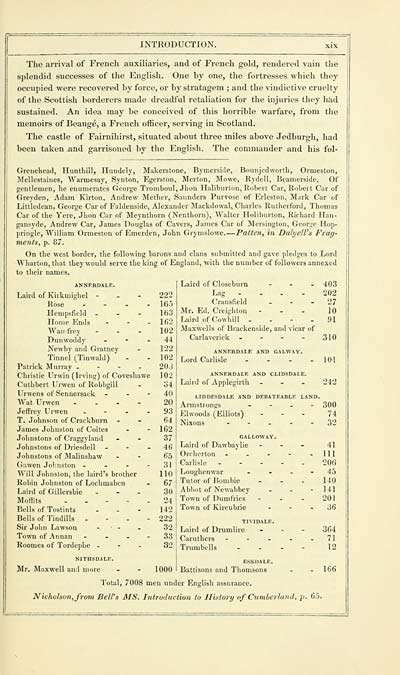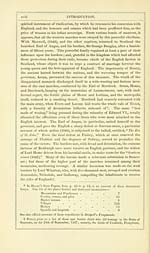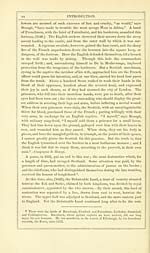Download files
Complete book:
Individual page:
Thumbnail gallery: Grid view | List view

INTRODUCTION.
The arrival of French auxiliaries, and of French gold, rendered vain the
splendid successes of the English. One by one, the fortresses which they
occupied were recovered by force, or by stratagem ; and the vindictive cruelty
of the Scottish borderei-s made dreadful retaliation for the injuries they had
sustained. An idea may be conceived of this horrible warfare, from tlie
memoirs of Beauge, a French officer, ser\dng in Scotland.
The castle of Fairnihirst, situated about three miles above Jedburgh, had
been taken .and garrisoned by the English. The commander and his fol-
Grenehead, Hunthill, Hundely, Makerstone, Bymcrside, Bounjedwortli, Ormeston,
Mellestaiiies, AVarmesay, Synton, Egerston, Merton, Mowe, Rydell, Bcamerside. Of
gentlemen, he enumerates George Troniboul, Jhon Haliburton, Robert Car, Robeit Car of
Greyden, Adam Kirton, Andrew Mether, Saunders Purvose of Erleston, Mark Car of
Littlcdean, George Car of Faldenside, Alexander Mackdowal, Cliarlcs Rutherford, Thomas
Car of the Yere, Jhon Car of Meynthorn (Nenthorn), Walter Holiburton, Richard Han-
gansyde, Andrew Car, James Douglas of Cavers, James Car of Mersington, George Hop-
pringle, William Ormeston of Emerden, John Grymslowe. — Patten, in DabjelVs Frag-
ments, p. 87.
On the west border, the following barons and clans submitted and gave pledges to Lord
Wharton, that they would serve the king of England, with the number of followers annexed
to their names.
Total, 7008 men under English assurance.
Nicholson, from Bell's MS. Introduction to History of Cumberland, p. 65.
The arrival of French auxiliaries, and of French gold, rendered vain the
splendid successes of the English. One by one, the fortresses which they
occupied were recovered by force, or by stratagem ; and the vindictive cruelty
of the Scottish borderei-s made dreadful retaliation for the injuries they had
sustained. An idea may be conceived of this horrible warfare, from tlie
memoirs of Beauge, a French officer, ser\dng in Scotland.
The castle of Fairnihirst, situated about three miles above Jedburgh, had
been taken .and garrisoned by the English. The commander and his fol-
Grenehead, Hunthill, Hundely, Makerstone, Bymcrside, Bounjedwortli, Ormeston,
Mellestaiiies, AVarmesay, Synton, Egerston, Merton, Mowe, Rydell, Bcamerside. Of
gentlemen, he enumerates George Troniboul, Jhon Haliburton, Robert Car, Robeit Car of
Greyden, Adam Kirton, Andrew Mether, Saunders Purvose of Erleston, Mark Car of
Littlcdean, George Car of Faldenside, Alexander Mackdowal, Cliarlcs Rutherford, Thomas
Car of the Yere, Jhon Car of Meynthorn (Nenthorn), Walter Holiburton, Richard Han-
gansyde, Andrew Car, James Douglas of Cavers, James Car of Mersington, George Hop-
pringle, William Ormeston of Emerden, John Grymslowe. — Patten, in DabjelVs Frag-
ments, p. 87.
On the west border, the following barons and clans submitted and gave pledges to Lord
Wharton, that they would serve the king of England, with the number of followers annexed
to their names.
Total, 7008 men under English assurance.
Nicholson, from Bell's MS. Introduction to History of Cumberland, p. 65.
Set display mode to: Large image | Transcription
Images and transcriptions on this page, including medium image downloads, may be used under the Creative Commons Attribution 4.0 International Licence unless otherwise stated. ![]()
| Early Gaelic Book Collections > J. F. Campbell Collection > Minstrelsy of the Scottish border > (27) |
|---|
| Permanent URL | https://digital.nls.uk/80600749 |
|---|
| Description | Volumes from a collection of 610 books rich in Highland folklore, Ossianic literature and other Celtic subjects. Many of the books annotated by John Francis Campbell of Islay, who assembled the collection. |
|---|
| Description | Selected items from five 'Special and Named Printed Collections'. Includes books in Gaelic and other Celtic languages, works about the Gaels, their languages, literature, culture and history. |
|---|

